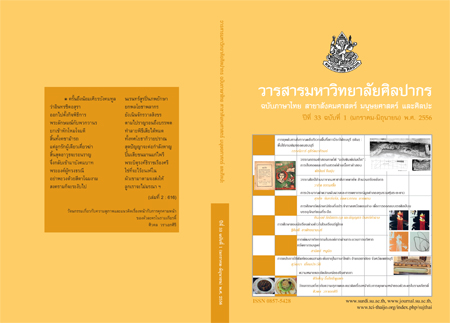นักเรียนต่างด้าวในโรงเรียนรัฐไทย Migrant Students in Thai Public Schools
Main Article Content
Abstract
บทคัดย่อ
บทความนี้รายงานผลจากการวิจัยเกี่ยวกับการศึกษาของนักเรียนต่างด้าวในโรงเรียนรัฐไทย ผู้วิจัยศึกษานโยบายของรัฐ และ การปฏิบัติของโรงเรียนรวมทั้งหน่วยงานที่เกี่ยวข้องในการจัดการศึกษาสำหรับนักเรียนต่างด้าวที่เรียนอยู่ในโรงเรียนของรัฐในระดับประถมศึกษาและมัธยมศึกษา ผู้วิจัยใช้ระเบียบวิธีวิจัยเชิงคุณภาพในการศึกษาวิจัย โดยวิธีการเก็บข้อมูล คือ การสัมภาษณ์ การสังเกต และ การศึกษาเอกสารที่เกี่ยวข้อง ผู้วิจัยสัมภาษณ์ครู ผู้บริหารสถานศึกษา เจ้าหน้าที่ในสำนักงานเขตพื้นที่การศึกษา เจ้าหน้าที่ผู้ที่เกี่ยวข้องกับนโยบายการศึกษาของเด็กต่างด้าวในกระทรวงศึกษาธิการ ผู้ปกครองนักเรียนต่างด้าว เจ้าหน้าที่ขององค์กรเอกชน นายจ้างของผู้ปกครองของต่างด้าว และ นักเรียนต่างด้าวที่เรียนในโรงเรียนรัฐ จำนวนทั้งหมด 40 คน นอกจากนั้นผู้วิจัยสังเกตชั้นเรียน และ เยี่ยมบ้านของนักเรียนต่างด้าว พื้นที่ในการทำวิจัยคือ จังหวัดระนองและจังหวัดปัตตานี ผลการวิจัยพบว่าถึงแม้รัฐจะมีนโยบายให้เด็กต่างด้าวเข้าเรียนในโรงเรียนของรัฐได้โดยไม่เสียค่าใช้จ่าย แต่ในทางปฏิบัติรัฐไม่มีการประชาสัมพันธ์ให้ผู้ปกครองชาวต่างด้าวรู้ถึงนโยบายนี้ นอกจากนั้นยังไม่มีการวางแนวทางปฏิบัติในการจัดนักเรียนต่างด้าวให้เข้าชั้นเรียนที่เหมาะสม การจัดการเรียนการสอนสำหรับนักเรียนต่างด้าวยังไม่มีการคำนึงถึงวัฒนธรรมของนักเรียนต่างด้าวเท่าใดนัก ผลการวิจัยพบว่านักเรียนต่างด้าวที่เรียนในโรงเรียนของรัฐออกกลางคันเป็นจำนวนมาก จากการวิจัยสรุปได้ว่าถึงแม้รัฐจะมีนโยบายให้เด็กต่างด้าวเข้าเรียนในโรงเรียนรัฐได้แต่ในทางปฏิบัติแล้วโอกาสทางการศึกษาของนักเรียนต่างด้าวยังถูกจำกัดอยู่มาก
คำสำคัญ: 1. เด็กต่างด้าว. 2. การศึกษา. 3. โรงเรียนรัฐไทย. 4. ประเทศไทย.
Abstract
This paper reports results of a study that uncovers educational experiences of migrant students who study in Thai public schools. The researcher examines the government’s education policies and the practices of schools and school districts concerning the education of migrant children who studied in primary and secondary schools. The researcher used qualitative research methods such as interview, observation and document examination, to obtain data. The researcher interviewed 40 informants consisting of teachers, administrators, education officers at the national and local levels, migrant parents, non-government officers, employers of migrant workers and migrant students. Classroom observation and house visit were also conducted. The research sites are Ranong and Pattani province. Research result shows that although the Thai government allows migrant children to study in Thai public schools, there are no PR activities to inform migrant parents about this policy. There is no guideline concerning the placement of migrant students into appropriate classroom. The curriculum and instruction are no relevant to the cultures of migrant students. Dropout rates are high. The paper concludes that although the government has a policy to allow migrant children to study in Thai public schools, in practices the educational opportunity of migrant children is still limited.
Keywords: 1. Migrant children. 2. Education. 3. Thai Public School. 4. Thailand.


